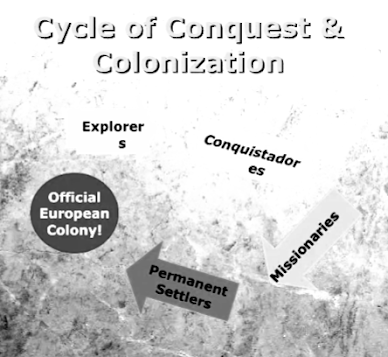"🤔 What does a Fence (fens) have in common with Colonialism?
Colonialism, at its core, was rooted in the violence of theft—a group seizing another's land and then erecting border fencing to safeguard their ill-gotten property. The concept of fences as we understand them today emerged just as colonization was commencing, intertwining the two in a complex historical narrative.
The term "fens" in Middle English initially meant "defense," with its evolved meaning of "surrounding with a fence" dating back to around 1500. This period coincided with the onset of modern colonialism, marked by European discoveries of sea routes around Africa's southern coast (1488) and America (1492).
Consider the Americas, once inhabited by Ancient Indians and
Amerindians. These indigenous peoples, often nomadic, traversed the continent's
coastlines, adapting to the varying fertility of the land dictated by climate
changes. Lacking the technology for permanent structures like fences, they
embraced a nomadic lifestyle.
Then came the European colonizers (The Foreigner Thief) around 1500, dominating the
Americas and restricting the nomadic movements of indigenous peoples. The
Europeans, having claimed the land, began erecting fences—physical and
metaphorical—to demarcate and protect their acquisitions. This shift from a
free land of nomadic peoples to a landscape divided by borders represents a
pivotal moment in history.
Take the descendants of Ancient Indians, whose ancestors
embraced nomadism. The impact of colonization persists as they, too, migrate in
large numbers to the United States. The colonial legacy, marked by stolen land
and fenced boundaries, influences the dynamics of movement and settlement in
the Americas.
In closing, exploring the historical convergence of fences and colonialism unveils a compelling narrative of theft, dominance, and the enduring repercussions on indigenous communities. Understanding these parallels enriches our perspective on the intricate interplay between cultural practices, land ownership, and the lasting effects of colonial legacies.
"What does a #fence (fens) have in common with #colonialism? Share your thoughts! #ThoughtProvoking #Colonialism #Fences"
About the Blogger: Renaldo McKenzie is the author of "Neoliberalism, Globalization, Income Inequality, Poverty and Resistance," and the upcoming book, "Neoliberal Globalization Reconsidered, Neo-Capitalism and the Death of Nations".
Renaldo is also the Creator and Host of The NeoLiberal Round Podcast, and YouTube Channel, Editor-in-Chief at The NeoLiberal (Journals, Post and Commentaries), President of The NeoLiberal Corporation, Doctoral Candidate at Georgetown University and Adjunct Professor at Jamaica Theological Seminary.
Email Renaldo at renaldocmckenzie@gmail.com.
Follow on Twitter, Facebook, LinkedIn, Reddit or TikTok.
The NeoLiberal Blogs is also available at The NeoLiberal Corporation Moral Magazine website: https://theneoliberal.com (The NeoLiberal Blogs (2010).
The Neoliberal is serving the world today to solve tomorrow's challenges by making popular what was the monopoly.
Visit us at https://theneoliberal.com and https://renaldocmckenzie.com.
Note: Also check out the podcast as we may develop this into a short reading and discussion on The NeoLiberal Round Podcast




Comments
Post a Comment